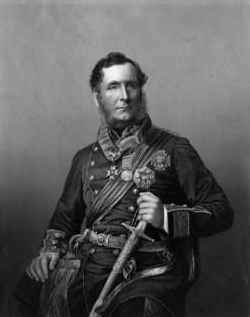Robert Vivian facts for kids
Quick facts for kids
Sir Robert Vivian
|
|
|---|---|

General Sir Robert Vivian, c. 1880
|
|
| Born | 1802 Arundel, Sussex, England |
| Died | 3 May 1887 (aged 84–85) Brighton |
| Allegiance | |
| Service/ |
|
| Rank | General |
| Battles/wars | First Anglo-Burmese War Crimean War |
| Awards | Knight Grand Cross of the Order of the Bath |
Sir Robert John Hussey Vivian (1802 – 3 May 1887) was a high-ranking British army officer. He served in the Madras infantry, which was part of the British East India Company's army in India. He came from the important Vivian family.
Contents
Early Life and Military Career
Sir Robert Vivian was born in 1802. He was the son of Sir Hussey Vivian, 1st Baron Vivian, a famous general. Robert was raised within the family and went to school at Burney's in Gosport, England.
In 1819, at age 17, he joined the East India Company's army. This company was a powerful British trading group that also had its own army in India. Robert started as an ensign, a very junior officer. The next day, he was promoted to lieutenant in the 10th native infantry regiment.
He arrived in Madras, India, in July 1819. After a short trip home, he returned to India in 1822. He became an adjutant in his battalion in 1823. An adjutant helps the commanding officer with daily tasks and administration.
Fighting in Burma
In 1824, Robert Vivian was sent to Burma (now Myanmar) to fight in the First Anglo-Burmese War. He served under Sir Archibald Campbell, 1st Baronet.
He took part in many important battles and actions:
- The capture of Rangoon in May 1824.
- Attacks on places like Yelgeo and Juzong.
- The capture of Kamandin in June.
- Defending against attacks on Rangoon in July.
- Fights along the Panglang river.
- Attacks on enemy forts at Thantabain.
In December 1824, he was slightly wounded during a big battle against the Burmese general Bandoola. He also fought in other actions in December.
In 1825, his army marched to Prome. Robert was promoted to captain in August. He continued to fight in battles like Simbike, and at Patanagoh. In 1826, he was at the storming of Malown and the Battle of Pagham-Mew. For his bravery and service in this war, he received a special medal. After the war, he took a break and went home.
Rising Through the Ranks
Robert Vivian returned to India in 1827. He was given a staff job as an assistant adjutant-general. This meant he helped manage army operations. He held similar roles until he was promoted to major in 1836.
In 1837, he took command of a battalion of the 10th Madras native infantry. In 1841, he led his troops to capture Fort Napani. His actions were praised by his commanders and the government.
He was promoted to lieutenant-colonel in 1841. In 1843, he moved to the 1st Madras European regiment. After another break at home, he returned to India in 1847. He was known as a very good commanding officer.
In 1849, he became the adjutant-general of the Madras Army. This was a very important role, overseeing the entire army's administration. He was promoted to colonel in 1851. When he left this role in 1853, he was again highly praised for his excellent service.
Later Career and Achievements
In 1854, Robert Vivian returned to England. He was promoted to major-general in November. The next year, he became a director of the East India Company.
The Crimean War
In 1855, he was given a special job during the Crimean War. He was appointed to lead the Turkish contingent, a force of about twenty thousand Turkish soldiers. He was given the temporary rank of lieutenant-general for this role.
He successfully organized this large force. During the winter of 1855–1856, his troops held an important position at Kertch. For his efforts in the Crimea, he received thanks from the British government. He also received a high Turkish award, the first class of the Order of the Medjidie, and the Turkish war medal.
Post-War Recognition
In 1857, Robert Vivian was made a Knight Commander of the Order of the Bath. This is a very special honor given by the British monarch. In 1858, he became a member of the new Council of India. This council helped govern British India from London.
He continued to receive promotions, becoming a lieutenant-general in 1862 and a full general in 1870. In 1871, he received an even higher honor, becoming a Knight Grand Cross of the Order of the Bath. He also served as a deputy-lieutenant for the city of London.
General Sir Robert Vivian retired from the army in 1877. He passed away on 3 May 1887, at his home in Brighton, Sussex.
Family
In 1846, Robert Vivian married Emma. She was the widow of Captain Gordon, who had also served in the Madras army. Emma passed away just four days before Sir Robert in 1887.
 | Chris Smalls |
 | Fred Hampton |
 | Ralph Abernathy |

